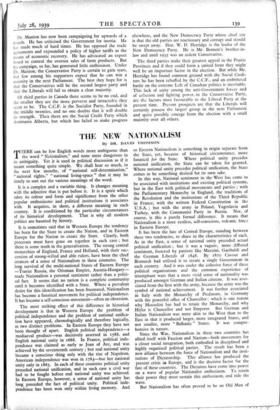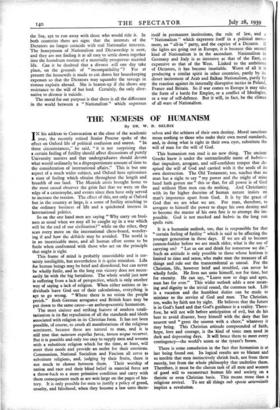THE NEW NATIONALISM
By DR. DAVID THOMSON
THERE can be few English words more ambiguous than the word "Nationalism," and none more dangerous in its ambiguity. Yet it is used in political discussion as if it meant something quite simple. We shall hear so much, in the next few months, of "national self-determination," "national rights," "national living-space" that it may be timely to sort out the various meanings of the word.
It is a complex and a variable thing. It changes meaning with the adjective that is put before it. It is a spirit which takes its colour and form and significance from the other popular enthusiasms and political institutions it associates with. It acquires, in short, a different meaning in each country. It is conditioned by the particular circumstances of its historical development. That is why all modern politics are haunted by history.
It is sometimes said that in Western Europe the tendency has been for the State to create the Nation, and in Eastern Europe for the Nation to create the State. Clearly, both processes must have gone on together in each case ; but there is some truth in the generalisation. The strong central monarchies of England, France and Holland, with their suc- cession of strong-willed and able rulers, have been the chief creators of a sense of Nationalism in these countries. The long survival of the multi-national States of Eastern Europe —Tsarist Russia, the Ottoman Empire, Austria-Hungary— made Nationalism a personal sentiment rather than a politi- cal fact. It seems that no nation is a complete community until it becomes identified with a State. Where a prevalent desire for this identification has been frustrated, Nationalism has become a fanatical movement for political independence. It has become a self-conscious movement—often an obsession.
The most striking effect of this difference in historical development is that in Western Europe the problem of political independence and the problem of national unifica- tion have appeared, chronologically and therefore logically, as two distinct problems. In Eastern Europe they have not been thought of apart. English political independence—a mediaeval product—was decisively asserted in 1588, and English national unity in 1688. In France, political inde- pendence was claimed as early as Joan of Arc, and was achieved by the seventeenth century ; but real national unity became a conscious thing only with the rise of Napoleon. American independence was won in 1783—but her national unity only in 1865. In each of these countries political unity preceded national unification, and in each case a civil war had to be fought before real national unity was achieved. In Eastern Europe, however, a sense of national unity has long preceded the fact of political unity. Political inde- pendence has been won only within living memory. And so Eastern Nationalism is something in origin separate from the State, yet, because of historical circumstance, more fanatical for the State. Where political unity precedes national unification, the State can be taken for granted. Where national unity precedes political unification, the State comes to be something desired for its own sake.
In this way, National sentiment in the West has come to be associated with institutions and existing political systems, but in the East with political movements and parties ; with the Parliamentary Monarchy in England, the traditions of the Revolution and the institutions of the Third Republic in France, with the written Federal Constitution in the U.S.A. ; but with the army in Poland, Yugoslavia and Turkey, with the Communist Party in Russia. Nor, of course, is this a purely formal difference. It means that Nationalism is a more restless, self-conscious, volcanic forcz in Eastern Europe.
It has been the fate of Central Europe, standing between these two tendencies, to share in the characteristics of each. As in the East, a sense of national unity preceded actual political unification ; but it was a vaguer, more diffused sentiment, fostered by patriots like Mazzini, Garibaldi and the German Liberals of 1848. By 1870 Cavour and Bismarck had utilised it to create a single Government in each country. And it was under the cohesive force of these political organisations and the common experience of triumphant wars that a more vivid sense of nationality was produced amongst German and Italian citizens. It was asso- ciated from the first with the army, because the army was the symbol of national achievement. It was further associated in Italy with the Monarchy of Piedmont, in Germany with the powerful office of Chancellor: which is one reason why Mussolini has had to retain the Monarchy, and why Hitler is Chancellor and not Emperor. But German and Italian Nationalism was more akin to the West than to the East in that it produced larger, more integrated States, and not smaller, more " Balkanic " States. It was compre- hensive in nature.
Since the War, Nationalism in these two countries has allied itself with Fascism and Nazism—both movements for a closer social integration, both embodied in disciplined and highly organised political parties. The result has been a new alliance between the force of Nationalism and the insti- tutions of Dictatorship. This alliance has produced the present crisis in Europe, and is the decisive factor for the fate of these countries. The Dictators have come into power on a wave of popular Nationalist enthusiasm. To retain their power they must sustain this enthusiasm, and ride the wave.
But Nationalism has often proved to be an Old Man of the Sea, apt to run away with those who would ride it. In both countries there are signs that the interests of the Dictators no longer coincide with real Nationalist interests. The honeymoon of Nationalism and Dictatorship is over, and they are not finding it at all easy to settle down together into the humdrum routine of a materially prosperouc married life. Can it be doubted that a divorce will one day take place, on the grounds of " incompatibility "? For at present the housewife is made to cut down her housekeeping expenses so that the Dictators may squander the savings in riotous exploits abroad. She is beaten-up if she shows any resistance to the will of her lord. Certainly, the only alter- native to divorce is suicide.
The moral for our purpose is that there is all the difference in the world between a " Nationalism " which expresses itself in permanent institutions, the rule of law, and a " Nationalism " which expresses itself in a political move- ment, an " all-in " party, and the caprice of a Dictator. If the lights are going out in Europe, it is because this second kind of Nationalism is in the ascendant. Nationalism in Germany and Italy is as intensive as that of the East, as expansive as that of the West. Linked to the ambitions of Dictators, it has become insatiable. Worst of all it is producing a similar spirit in other countries, partly by its direct incitement of Arab and Balkan Nationalism, partly by the reaction against its internally disruptive tactics in Poland, France and Britain. So if war comes to Europe it may take the form of a battle for Empire, or a conflict of Ideologies, or a war of self-defence. But it will, in fact, be the climax of all wars of Nationalism.









































 Previous page
Previous page